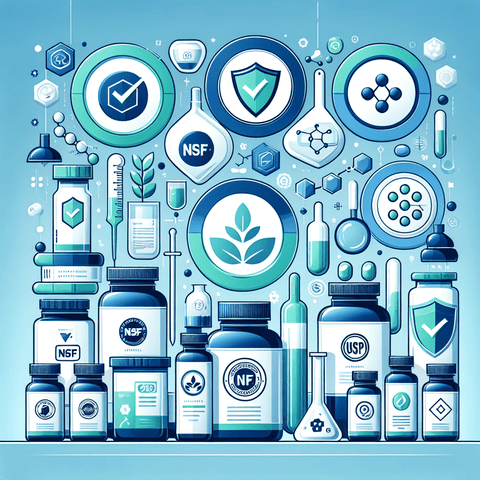Introduction
In an era where health consciousness is at an all-time high, dietary supplements have become an integral part of many individuals' daily routines. From enhancing immune function to supporting bone health and improving energy levels, these products promise numerous benefits. However, with the burgeoning supplement industry comes a critical concern: ensuring that the products consumers purchase are both safe and of high quality. Not all supplements are created equal, and without proper oversight, consumers may encounter products contaminated with harmful substances or that do not contain the labeled ingredients in accurate amounts.
The importance of quality and safety in nutritional supplements cannot be overstated. Contaminants such as heavy metals, microbes, or unlisted ingredients pose health risks, while inconsistent potency can lead to ineffective outcomes or adverse effects. As a result, the demand for reliable certifications has skyrocketed, serving as independent assurances of a product’s integrity. These certifications act as trust signals, letting consumers make informed choices rather than relying solely on marketing claims or labeling.
In this comprehensive guide, we will explore the top dietary supplement certifications that guarantee quality and safety. We will delve into what these certifications mean, which organizations provide them, and how they can help consumers select trustworthy products. Armed with this knowledge, you will be better equipped to navigate the supplement aisle confidently, choosing options that truly support your health goals.
Understanding Dietary Supplement Certifications: Significance and Overview
Dietary supplement certifications are official recognitions awarded by independent third parties or governing bodies that verify a product’s compliance with stringent quality, safety, and purity standards. Unlike regulatory oversight alone—which varies significantly across regions—these certifications offer an added layer of assurance, often involving detailed testing, facility audits, and product review processes.
Why do certifications matter? They provide a standardized benchmark for quality assurance, reducing the risk of adulteration, mislabeling, or contamination. For consumers, this means greater confidence that the supplement they are purchasing contains what it claims, free from harmful substances. Certifications also foster transparency, encouraging manufacturers to uphold high standards and continually improve their processes.
Key organizations involved in the supplement certification landscape include NSF International, United States Pharmacopeia (USP), ConsumerLab, and Informed-Sport or Informed-Choice. Each has its own set of rigorous standards and testing protocols, serving as important indicators of a product’s reliability. For example, NSF and USP focus on purity and potency, while ConsumerLab independently tests products for contaminants and ingredient accuracy. Recognizing these certifications empowers consumers to discern trustworthy products amidst a crowded market.
GMP Compliance: Ensuring Manufacturing Excellence and Consistency
Good Manufacturing Practices (GMP) form the foundation of high-quality dietary supplement production. GMP is a system mandated by regulatory agencies such as the U.S. Food and Drug Administration (FDA), setting the minimum standards that manufacturers must follow in designing, manufacturing, packaging, labeling, and storing dietary supplements. These practices aim to ensure that products are consistently produced to meet quality standards and are safe for consumer use.
GMP compliance safeguards product quality and consumer safety by minimizing risks associated with contamination, mislabeling, and batch-to-batch variability. Facilities adhering to GMP standards implement rigorous quality control measures, including validated cleaning procedures, employee training, proper documentation, and testing at various production stages. This systematic approach reduces errors and ensures the integrity of the final product.
Examples of GMP standards from regulatory bodies include the FDA’s current Good Manufacturing Practices for dietary supplements, which emphasize personnel qualifications, facility controls, equipment calibration, and process validation. Additionally, independent third-party certifications like NSF International or NSF Certified for Sport explicitly verify GMP adherence through extensive audits, providing consumers with added assurance of manufacturing excellence. When a supplement bears a GMP-related certification, it signals that the product has been produced under controlled, accountable conditions, fostering trust in its quality and safety.
Third-Party Testing: Independent Verification of Purity and Potency
Third-party testing is a critical process whereby independent, accredited laboratories analyze dietary supplements to verify label claims and screen for contaminants. Unlike manufacturer-only testing, third-party verification offers an unbiased assessment, ensuring that products are pure, potent, and safe for consumption. This process is vital because it helps identify issues such as unlisted ingredients, microbial contamination, heavy metals, or adulterants that could pose health risks.
During third-party testing, laboratories perform a series of standardized analyses, including testing for microbial contamination, heavy metals (such as lead, arsenic, cadmium, and mercury), residual solvents, pesticides, and verification of active ingredient levels. Results are then compared against specifications set by certifying organizations or regulatory standards. A product that passes these rigorous tests often bears a certification seal from organizations like NSF International, USP, or ConsumerLab.
These independent claims provide consumers with transparency and confidence, knowing their supplements are verified by impartial experts. For example, a supplement labeled with the NSF Certified for Sport seal indicates that it has undergone extensive testing for banned substances and contaminants, making it suitable for athletes and health-conscious consumers. Similarly, USP Verified products are evaluated for purity, potency, and manufacturing quality, reinforcing trustworthiness. Incorporating certified products into your routine reduces the risk of ingesting unsafe substances and ensures ingredient accuracy, which is especially critical if you rely on supplements to meet specific health needs.
Quality Assurance Standards: Systematic Approaches to Product Development
Beyond individual certifications, many companies adhere to comprehensive quality assurance (QA) standards that encompass every stage of product development from sourcing to final packaging. Quality assurance involves implementing structured procedures and continuous improvement practices to ensure consistent quality and safety.
Standards like ISO 9001, an international quality management system certification, provide a framework for establishing effective process controls, document management, internal audits, and corrective actions. While ISO 9001 is broad, many supplement companies adopt it or similar standards tailored specifically for dietary supplement manufacturing. These standards emphasize systematic management practices that lead to higher quality products over time.
In addition, industry-specific guidelines from organizations like the International Organization for Standardization (ISO) or Good Manufacturing Practices (GMP) certification are incorporated into QA systems. They cover key aspects such as ingredient sourcing, batch testing, accurate labeling, and effective packaging. These systematic approaches demonstrate a company's commitment to quality beyond just certification labels, ensuring that every product batch meets high standards and complies with regulatory requirements. Consumers should look for brands that showcase their quality assurance programs and provide transparency around their processes, instilling confidence that their supplements are not only certified but also developed with a commitment to continuous quality improvement.
FDA Verification: Regulatory Oversight and Compliance in the United States
The U.S. Food and Drug Administration (FDA) plays a significant role in regulating dietary supplements, though its authority is different from that of drugs or medical devices. The FDA’s primary approach involves overseeing manufacturer compliance with existing laws and regulations, mainly through the enforcement of Good Manufacturing Practices and post-market surveillance.
Manufacturers are required to register their facilities with the FDA and comply with Current Good Manufacturing Practice (cGMP) regulations. These standards ensure that products are consistently manufactured and controlled by quality processes, reducing risks of contamination and mislabeling. However, the FDA does not approve dietary supplements before they reach the market. Instead, their oversight primarily involves monitoring adverse event reports, conducting inspections, and issuing warning letters or recalls if safety issues are identified.
FDA warning letters can point to violations such as mislabeled ingredients, contamination, or false health claims. A history of voluntary recalls or warning notices indicates that a manufacturer takes quality seriously and complies with regulatory standards. Nevertheless, because enforcement is reactive rather than proactive, consumers are encouraged to seek additional verification from third-party certifications. Certifications from organizations like NSF International or USP supplement the FDA’s oversight by providing independent confirmation of safety, purity, and potency. Recognizing a supplement’s FDA registration status and compliance with cGMP is essential, but relying on third-party certifications adds an extra layer of assurance for health-conscious consumers.
Supplement Purity Certifications: Guaranteeing Clean and Safe Ingredients
Purity is a vital aspect of supplement quality, directly impacting safety and efficacy. Certifications focused on purity ensure that products are free from harmful contaminants, microbes, and unlisted substances. These certifications set strict standards for testing and quality control measures applied during manufacturing across the entire supply chain.
Among the most recognized purity certifications are NSF Certified for Sport, USP Verified, and Informed-Sport. Each emphasizes contaminant testing, heavy metal analysis, microbial limits, and allergen control. For example, NSF Certified for Sport not only verifies that a supplement contains the ingredients listed but also confirms the absence of banned substances, making it ideal for athletes. Conversely, USP Verified ensures that the product meets specific standards for identity, strength, purity, and consistency, giving consumers confidence in the product’s integrity.
By choosing supplements with these certifications, consumers can trust that the ingredients they ingest are clean and safe. This is especially crucial for individuals with sensitivities or allergies, or those who require high-purity products for medical reasons. When browsing supplements like [Vitamin C for immune support](https://www.topvitamine.com/collections/vitamin-c-benefits-immunity-antioxidant-energy), [Vitamin D sources](https://www.topvitamine.com/collections/vitamin-d-benefits-sources-safety), or [Omega-3 fatty acids](https://www.topvitamine.com/collections/dha-epa-omega-3-supplements), look for products bearing purity certification seals to ensure you are selecting the safest and highest-quality options available.
How to Choose Supplements with Reliable Certifications
With numerous products claiming superior quality, how can consumers confidently select supplements with reliable certifications? The key is understanding certification seals, verifying their authenticity, and combining multiple indicators of quality. Here are some practical tips:
- Read labels carefully: Look for certification seals from reputable organizations such as NSF, USP, or ConsumerLab. Recognize their logos and understand what they signify.
- Verify certification authenticity: Visit certification organization websites to confirm a product’s status. Many certifiers provide searchable databases or product verification tools.
- Request transparency from manufacturers: Reputable brands often provide detailed certificates of analysis (COA) and quality reports. Review these documents if available to confirm testing standards and results.
- Check for multiple certifications: Products bearing more than one certification—such as GMP compliance, USP verification, and third-party contaminant testing—offer enhanced assurance.
- Look beyond certifications: Be cautious of red flags such as unsubstantiated health claims, inconsistent ingredient lists, or brands with a history of recalls. Conduct research and read consumer reviews.
By integrating these strategies, you can confidently choose supplements that are not only certified but also transparently committed to the highest standards of quality and safety.
Conclusion
Ensuring the quality and safety of dietary supplements is a fundamental aspect of making informed health choices. Certifications from trusted organizations such as NSF International, USP, and ConsumerLab play a crucial role by providing independent verification of product integrity, purity, and manufacturing standards. GMP compliance guarantees that products are produced under strict quality controls, while third-party testing confirms label accuracy and contaminant-free ingredients. These standards collectively help consumers distinguish reliable supplements from those that may pose risks to health or efficacy.
As you navigate the vast supplement market, prioritize products with verified certifications, scrutinize labels carefully, and seek transparency from brands. Doing so not only helps protect your health but also supports manufacturers committed to high-quality standards. Remember, a well-certified supplement can be a trustworthy addition to your health regimen, contributing positively to your well-being.
By staying informed and vigilant, you harness the power to select products that truly support your health goals and offer safety assurances—because quality matters.
Q&A Section
What are the most recognized dietary supplement certifications?
Some of the most recognized certifications include NSF Certified for Sport, USP Verified, and ConsumerLab. These organizations perform extensive testing for purity, potency, and manufacturing quality, providing reliable assurance of a product’s standards.
Why is GMP compliance important in dietary supplements?
GMP compliance ensures that supplements are consistently manufactured under controlled conditions, reducing risks such as contamination, mislabeling, and quality variability. It is the foundational standard that supports product safety and reliability.
How can I verify if a supplement’s certification is genuine?
Visit the certifying organization’s official website and use their verification tools or search databases. Also, review the product’s certificate of analysis provided by the manufacturer when available.
Are FDA regulations enough to guarantee supplement safety?
While FDA regulations and cGMP compliance set essential standards, they are primarily reactive. Supplement certifications from independent third parties offer additional, proactive verification of purity, potency, and manufacturing quality.
What should I look for besides certifications when choosing a supplement?
Beyond certifications, consider the brand’s transparency, ingredient sourcing, manufacturing practices, and customer reviews. Be cautious of unsubstantiated health claims or inconsistent labeling.
Important Keywords
- Dietary supplement certifications
- GMP compliance
- Third-party testing
- USP Verified
- NSF Certified
- ConsumerLab
- Supplement purity
- Safety standards
- Quality assurance
- Supplement verification



